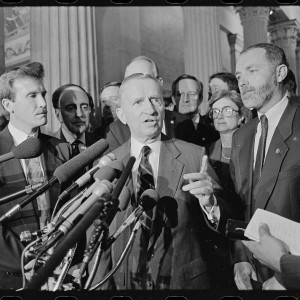Last fall, record numbers of Americans tuned in to watch Hillary Clinton and Donald Trump face off in the presidential debates. After each one, discussion of the gaffes, missteps, and zingers doled out by each candidate dominated the news cycle, giving each of them valuable media attention. No third-party candidate gained such a bump, since none were allowed on the debate stage. Now, a new lawsuit is trying to change that by pressuring the Federal Election Commission to change the rules governing which candidates can participate in presidential debates.
On Thursday, the U.S. District Court of the District of Columbia heard arguments for Level the Playing Field, et al., vs. FEC. Brought forward by Level the Playing Field (LPF), Dr. Peter Ackerman, the Green Party of the United States, and the Libertarian National Committee, the case argues that current Commission on Presidential Debate rules make it all but impossible for a third party candidate to gain the name recognition needed to make a successful bid for the presidency.
The plaintiffs seek to force the FEC, which chooses the CPD to manage the debate process, to change the rules governing the debates so as to not unfairly exclude third party candidates. Speaking at a private luncheon after the hearing, lawyer Alexandra Shapiro was hopeful that the judge’s ruling would be favorable.
Right now, candidates are only allowed on the debate stage if their popularity reaches above 15 percent “as determined by five selected national public opinion polling organizations, using the average of those organizations’ most recently publicly-reported results at the time of the determination.”
This metric has its flaws, however. As the 2016 election cycle demonstrated, polling data is increasingly inaccurate as a means of predicting eventual election results.
Additionally, reaching this level of popular support, would require hundreds of millions of dollars, says Ackerman. And since third-party candidates are also subject to different campaign finance laws than Republicans and Democrats, they must raise this money through smaller donations.
The result is the present duopoly, where presidential contests boil down to the two candidates on the debate stage.
“Since its inception, the CPD has been bipartisan, not nonpartisan,” the plaintiffs argued. “Leaders of the two major parties founded the CPD to create “a permanent framework on which all future presidential debates between the nominees of the two political parties will be based.”
Level the Play Field’s goal is a subtle, yet significant shift, from a “bipartisan” commission to a “nonpartisan” one. They hope that the addition of a third figure on the stage would change the timbre of the event, discouraging the sort of relentless negative campaigning that currently dominates the later stages of a presidential campaign.
Despite the influence it has over the electoral process, the CPD, which has sponsored presidential and vice presidential debates since 1988, is a secretive organization. Officially a nonpartisan 501(c)(3) organization, the CPD explains that it gets its funding from “the communities that host the debates and, to a lesser extent, from corporate, foundation and private donors.”
Winning the lawsuit would take the odds of electing a third party candidate from impossible to difficult.
This is not the first time that the FEC’s nonpartisan status has been questioned. In late 1997, third party candidate Ross Perot sued the FEC, arguing that significant sections of the federal election laws discriminate against third party candidates.
And, in 2000, Donald Trump bowed out of the Reform Party’s primary with a letter to the New York Times. The letter explained his belief that external circumstances had destroyed “any viable chance” that his campaign had. First on his list was the Commission on Presidential Debates.
“The Commission on Presidential Debates, made up solely of Republicans and Democrats, produced debate criteria specifically designed to keep the Reform Party’s candidate out of the fall debates,” Trump wrote.
“I felt confident that I could sell the American people if I could get into the debate, but my lawyers told me that was unlikely,” he continued.
Fifteen years later, the plaintiffs acknowledge the irony of the situation, but say that it makes the case for change even stronger. Having finished oral arguments, the plaintiffs await the judge’s decision and have said they are likely to appeal again if they do not receive the judgement they seek.

